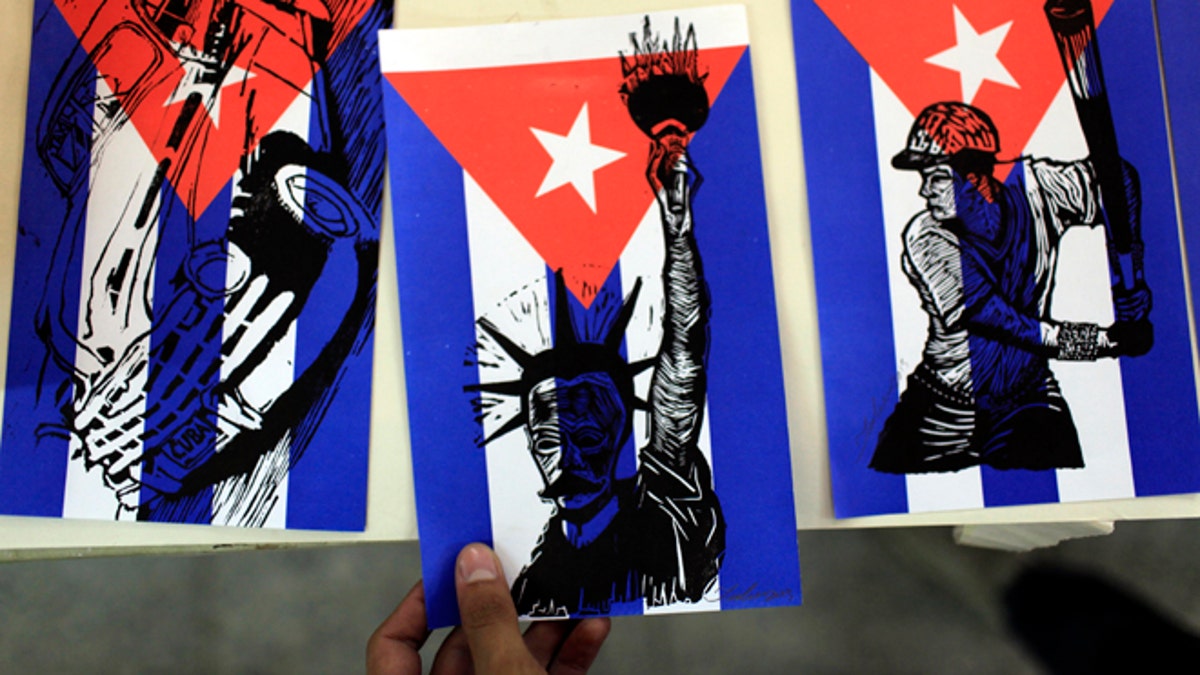
In this July 8, 2013 photo, a man takes a paper Cuban flag covered by an image of the Statue of Liberty and the face of the Cuban hero Jose Marti at the Experimental Graphic Workshop in Havana, Cuba. For a place where most people earn just $20 a month at their government jobs, Havana can be a surprisingly expensive place to be a traveler. But there are plenty of free ways to have fun in this city known for sea, sun and salsa. (AP Photo/Franklin Reyes) (AP2013)
Havana – The Cuban Communist Party newspaper Granma reported Friday that the number of Cubans receiving U.S. nonimmigrant visas jumped by 79 percent in the first half of the year.
According to statistics published by Granma, the U.S. Interests Section in Havana issued 16,767 such visas in the first six months of 2013, compared to 9,369 in the same period last year.
Officials at the Interests Section, which Washington maintains in Cuba instead of an embassy because the countries do not have full diplomatic ties, confirmed the figures.
On its website, the Section said it recently beefed up its capacity for handling application interviews to 500 per day, up from 120 to 150 per day a year ago.
"This has substantially reduced the wait for an appointment, and we are working to reduce that wait time even further by the end of 2013," the webpage read.
- Cuba Says Smuggled Weapons On North Korean Ship Are Old, ‘Obsolete’
- Fidel Castro Accuses Cuba Foes Of Lying About Arms On North Korea-Bound Boat
- Former Cuban Prison Chief Hiding In U.S., Sources Say
- Miami Gold Heist Leads To International Manhunt For Cuban Migrant
- Cuban Weapons Cache Discovered On North Korean Ship Included Two Russian Military Jets
- Best Sports Pix Of The Week
- Cuba’s Skateboarding Revolution
Granma's report was published a day after a new U.S. policy took effect extending multiple-entry visas valid for five years to Cubans who are approved for nonimmigrant travel to the United States. Before, most such visas were good for six months and a single entry.
In Havana's first official public reaction to the change announced Wednesday, Granma noted that it makes life easier for Cubans by eliminating the need to show up in person and pay a $160 processing fee each time they want to travel to the U.S., but said it doesn't represent a change in U.S. attitudes toward Cuba.
"New instruments, same policy," read the headline.
A U.S. State Department spokesman also said this week that the modified visa rules do not amount to a significant change in Washington's Cuba policy.
High-level Cuban and U.S. officials met in Washington last month for a new round of migration talks that are supposed to happen every six months, but had been stalled since January 2011.
And earlier this year Cuba scrapped the widely detested exit visa that for decades had been required of any islander seeking to travel abroad. It also extended from one to two years the amount of time Cubans can remain overseas without losing residency rights and benefits back home.
Havana reserved the right to deny passports in some cases for essential personnel or for people with pending legal matters, but government opponents have mostly been free to travel overseas and return, often after bashing President Raúl Castro's Communist system in very public forums.
Based on reporting by The Associated Press.
Follow us on twitter.com/foxnewslatino
Like us at facebook.com/foxnewslatino




